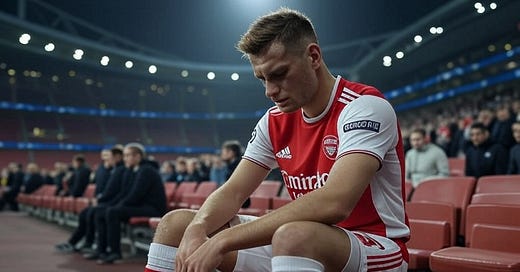Arsenal suffered a defeat against PSG in the Champions League semifinals this year. Despite this result, Arsenal’s season can be considered quite successful. Many fans had hoped that the London team could overcome PSG in this decisive encounter.
Comparison Between Arsenal and PSG
However, the reality is that Arsenal is not yet in a position to compete at the level of teams like PSG, one of the giants of world football. This status of PSG is not solely due to its history, which it also has, but primarily to its economic power.
Over the years, the Parisian club has received massive investment, especially since the arrival of Qatari capital. Before this, PSG was a rather mediocre team in the French landscape, but these financial injections have transformed it into a sporting powerhouse. In contrast, Arsenal, although a club with a rich tradition, cannot match the level of investment or the sporting capacity that PSG has achieved thanks to its financial backing.
The Economic Model of Football and Its Sustainability
But this model has its limitations. Despite PSG’s current dominance, it does not seem sustainable in the long term, especially compared to teams like Arsenal. This is not due to Arsenal’s specific qualities but because it belongs to a league, the Premier League, which could surpass other European competitions if the rest of the continent does not react.
Teams like PSG, Bayern Munich, Real Madrid, Barcelona, or Inter Milan dominate now, but the dynamics of their leagues could change the landscape in the future.
Beyond this rivalry, there is an aspect often overlooked: the relationship between the development of sports teams and the progress of the cities and countries they represent.
In football, sporting success attracts better players, which creates a more appealing spectacle and, consequently, higher revenues. These revenues allow the signing of even more talented players, perpetuating a cycle of success. This mechanism, which we could call “the wheel of football success,” is not exclusive to sports; it reflects the principles of economic success and capitalism at their peak.
Football is, after all, a business operating in a market, and societies that adopt certain economic ideas can propel their teams to triumph, while those that reject them tend to fall behind.
Concrete Examples: Barcelona, London, New York, and Madrid
Barcelona: Apparent Success, Underlying Problems
A clear example is Barcelona. Although they reached the semifinals this year, their success is more due to luck and the talent of their youth academy—with players like Lamine Yamal, Pedri, and others—than to solid planning.
The club cannot compete with the world’s best teams because it is undergoing a severe economic crisis, the result of spending more than it earns, a basic rule they have violated. This situation not only affects the team but also reflects the decline of the city of Barcelona.
Over the past ten years, policies in Catalonia have been contrary to economic success, with increased public spending and an aversion to profit and capitalism. As a result, Barcelona is one of the most indebted clubs in the world, and without drastic change, it could face bankruptcy.
Additionally, La Liga exacerbates this problem by not being meritocratic: money is distributed unequally, always favoring the same teams (Real Madrid and Barcelona) regardless of their performance. This reduces incentives to improve and affects the overall quality of the spectacle, making only matches between the big teams attractive.
London and the Premier League: A Model of Success
In contrast, the English Premier League represents an opposite model. It is a meritocratic and capitalist league, where success is rewarded, and the product is constantly improved. London, despite the challenges of Brexit, remains a global capital, and the Premier League attracts American owners who bring a focus on competition and profit.
This system fosters a virtuous cycle: competition improves the spectacle, which generates more revenue and allows the signing of better players.
As a result, the Premier League has become the richest and most attractive league in Europe, and its influence could grow even further over time.
New York: Sports as a Reflection of Urban Life
Across the Atlantic, New York offers another interesting case. Teams like the New York Knicks have been in decline for over 20 years, a period that coincides with the city’s decline as a global capital.
However, a sporting renaissance could revitalize the spirit of its residents and restore some of New York’s former splendor. Sports have the power to inspire a society to want to “win again,” and this could apply to the Knicks as well as other local NFL teams, like the Jets or Giants, which have also lagged behind.
Madrid: Progress and Excellence
Meanwhile, Madrid and Real Madrid are an example of success. The city and region have embraced ideas of progress, innovation, and economic freedom, making them the fastest-growing in Spain.
This spirit is reflected in Real Madrid, an institution obsessed with excellence that inspires Madrid’s society. However, the club also suffers from La Liga’s limitations, where the lack of meritocracy and prioritization of economic progress hinders the competition’s potential.
Conclusion: Competition and the Future
In conclusion, Arsenal’s defeat against PSG was disappointing but not concerning, as the team is part of a positive dynamic within the Premier League. On the other hand, I hope PSG’s success will push Paris and other cities, like Milan, to regain their past brilliance.
It is not healthy for only one country, like the United Kingdom, to dominate the European landscape in terms of development and football competitiveness. We need cities like Paris and Milan to rise to London’s level to ensure a promising future for football and Europe as a whole.
If this does not happen, the future of European football could be concentrated exclusively in the United Kingdom.













Share this post